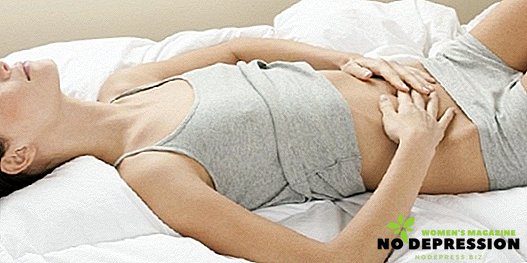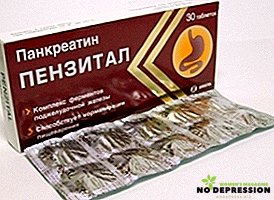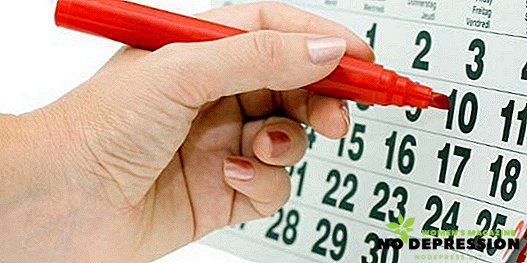Abdominal pain is a symptom that every person faces more than once in their lives. The pain is of a different nature - dull, acute, paroxysmal and indicates a wide range of possible diseases.

Types of abdominal pain
Abdominal pain is divided into visceral and somatic, each of which has its own characteristics.
Visceral pain
Visceral pain occurs when nerve endings in the walls of organs are involved in the process, with spasms, inflammation or lack of blood supply. It occurs in the form of dull paroxysmal pain, sometimes of a diffuse nature.
The aching pain of a visceral nature is irradiated, that is, the projection of pain on organs, the nerves of which originate from the same root.
Somatic pain
Somatic pain occurs when the nerves of the spinal node are irritated as the pathology develops. Such pains are acute and permanent.
The patient can indicate the exact location of the area affected by pain, takes a forced posture. Pain increases with coughing, deep breathing and changing position.

Where and how does the stomach hurt: possible causes
At the place of localization of sensations, you can get an idea of what pathology develops in the body:
- The pain of a sharp character in the right side indicates the formation of stones in the gall bladder, although more often this pathology is asymptomatic. After eating the pain is more pronounced;
- Pain in the left lower abdomen indicates the formation of polyps in the large intestine. Stones form on the wall of the colon, which leads to inflammation and possible perforation of the intestine;
- Abdominal pain on the right side, radiating to the center of the abdomen indicates appendicitis, this disease is usually treated surgically;
- Spilled abdominal pain, accompanied by constipation or diarrhea, slimy stools and increased gas can be triggered by irritable bowel syndrome;
- Acute, burning pain in the epigastric region, especially noticeable in the morning, indicates the development of gastritis, peptic ulcer or esophagitis (inflammation in the esophagus);
- In women, pain in the lower abdomen indicates inflammation in the uterus, the formation of cysts or fibroids. During menstruation, lower abdominal pain is caused by a spasm of the smooth muscles of the uterine wall.

Also, the pain can be triggered by food poisoning, the causative agent of a bacterial or viral nature, an allergic reaction to food or kidney and bladder disease.
When do I need to see a doctor?
If abdominal pains are one-time in nature and last for a short time, you can solve this problem yourself. If the pain persists for more than a month, you need to undergo a medical examination to determine the nature of the disease. An urgent appeal to specialists is required in the case of:
- development of jaundice;
- a rise in temperature accompanied by nausea, vomiting and diarrhea;
- if the pain is unbearable and accompanied by tension of the abdominal wall;
- the attack of pain lasts for several hours without stopping;
- in women there is a violation of the menstrual cycle, a small amount of blood is separated, or too much;
- with vomiting of blood or black clots - this indicates gastric bleeding.
In the event of such severe symptoms, it is forbidden to engage in self-treatment; this can be fraught with serious consequences, including death.
What pills will help for pain?
Preparations for abdominal pain are divided into groups, the drug belonging to the group is determined by the nature of the disease, the symptoms of which the medicine is fighting.
Antidiarrheal pills
Treatment of diarrhea is directed primarily at the cause of the disease: elimination of toxins or pathogens from the gastrointestinal tract, secondary drugs are designed to arrest the symptoms: reduce pain and normalize stools. List of pills for diarrhea and abdominal pain:
- Enterosorbents are used for excretion of waste products of bacteria from the body: Laktofiltrum, Polifan, Polysorb;
- Probiotics, for the normalization of intestinal microflora and protection of the intestinal wall from pathological microbes: Dufalac, Prelaksan;
- To combat infection, antibiotics are selected by the doctor individually for each patient.
Additional measures include the fight against dehydration, as well as the selection of a gentle diet that will compensate for the harm done to the patient's digestive system.
Stomachache
Drugs in this group reduce heartburn and stop dyspeptic phenomena: nausea, emetic urge. Some drugs, for example, Linex, restore the balance of microflora in the gastrointestinal tract, reduce gas formation and normalize stool.
- Linex;
- Motilium;
- Allohol;
- Penzital;

- Trimedat;
- Gastal.
Some antispasmodics can also help:
- Papaverine;
- Halidor
These drugs will help relieve spasm of the smooth muscles of the stomach and small intestine, often arising from gastritis and ulcers.
With painful menstruation
A group of drugs used to reduce pain during menstruation. What pills help with abdominal pain during menstruation:
- Ibuprofen;
- Iklofenak;
- Piroxicam.
From analgesics with severe pain are prescribed:
- Analgin;
- Baralgin;
- Novalgin.
The third group of drugs that can facilitate the flow of menstruation are antispasmodics:
- Spasmalogon;
- Spazgan;
- Drotaverinum;
- Papaverine.
Does the stomach hurt during pregnancy: which pill can you drink?
During the first trimester, doctors advise to refrain from taking medications whenever possible: during this period the main organs and systems of the child are laid, and any impact can disrupt the process and lead to congenital abnormalities.
From week 16, you can take drugs with caution: with full weight the placenta begins to play the role of a protective barrier.
To relieve abdominal pain during pregnancy, some painkillers are allowed:
- Paracetamol;
- Nurofen - with care, it can cause a decrease in the volume of amniotic fluid;
- Drotaverinum;
- Ibuprofen;
- Papaverine.
If necessary, treatment with other drugs should be carefully read the instructions, carefully observe the dosage. If the pain is weak and passes in a short time, it is advisable not to take pills.
Antispasmodics can be used for uterine spasms to prevent spontaneous abortion.
Painkillers for abdominal pain for children
It is necessary to approach the treatment of children with all possible caution: in childhood, the risk of developing complications is especially high, and the side effects are more acute.
It is necessary to give medicines taking into account the cause of the disease and symptoms.
With flatulence in the younger age group, it is possible to take drugs such as:
- Mebeverin;
- Buscopan
For the treatment of constipation in babies are used:
- Mezim;
- Festal.
Sorbents are allowed for use at children's age:
- Polypefan;
- Laktofiltrum;
- Enterosgel
With a rise in temperature, abundant vomiting and diarrhea in children, immediate medical attention is necessary, independent diagnosis and treatment are prohibited!
Possible contraindications
Before taking this or that drug, you must carefully read the instructions: for some associated diseases can not take drugs.
Antispasmodics
Antispasmodics are not prescribed for the following pathologies:
- inflammatory processes in the large intestine;
- abnormal increase in the rectum, (megacolon);

- infectious intestinal diseases, the causative agents of which are bacteria.
In tuberculosis of any form, antispasmodic drugs are strictly contraindicated.
Gastritis pills
Drugs aimed at combating gastritis, it is not recommended to take in the case of:
- diagnosed renal or hepatic insufficiency, both acute and chronic;
- risk of internal bleeding.
- idiosyncrasy drugs.
Analgesics
When diseases of the gastrointestinal tract can not use aspirin: it has an ulcerogenic effect (provokes the development of ulcers on the surface of the gastric mucosa and duodenal ulcer).
- Analgesics are prescribed with caution in renal failure, as well as diseases of the cardiovascular system;
- Tablets of any type are not recommended for use during breastfeeding: many drugs reach significant concentrations in breast milk and adversely affect the health of the child. In addition, the quality of milk deteriorates, the child may refuse to eat and lose weight;
- If it is impossible to do without pills, the child must be temporarily transferred to artificial mixtures;
- Children under 12 years old, all drugs are prescribed with caution and only in consultation with your doctor.

During the period of menstruation it is not recommended to abuse drugs: this may increase bleeding.
Conclusion
- Tablets for abdominal pain should be selected on the basis of the results of diagnosis, carefully observe the dosages and prescriptions of the doctor: regimen, diet, taking additional medications or dietary supplements;
- You can not self-medicate, to clarify the diagnosis should consult a doctor;
- During pregnancy and lactation, you should limit the intake of any medication.
Compliance with these rules will help maintain health and avoid complications.
For more information about abdominal pain, see the following video.














